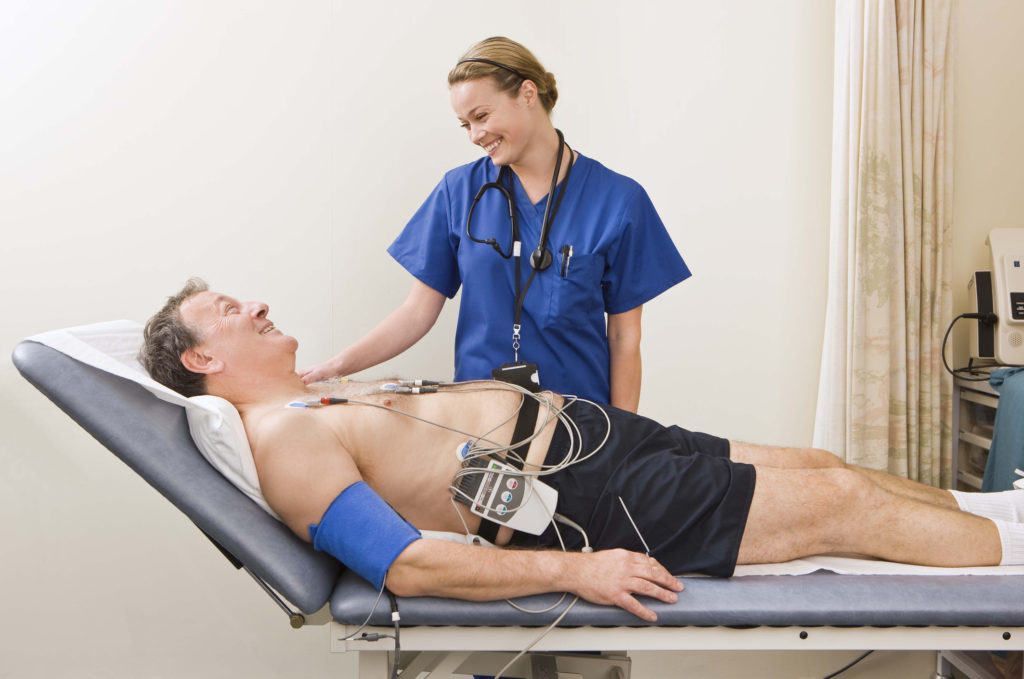Stories you may like
ECG technician
An ECG technician, or an EKG technician, is a healthcare professional that operates a machine called an electrocardiograph. Technicians perform diagnostic tests with these machines to help medical practitioners identify illnesses and need specialised skills to operate those machines. Understanding the skills and education pathway to become an ECG technician can help you plan your career path in healthcare. In this article, we explain how to become an ECG technician, discuss the average salary for an ECG technician and examine core skills for the job.
What are the jobs and responsibilities of an ECG technician?
-
ECG technicians should be expected to regularly perform heavy lifting to move patients and equipment.
-
They should also be able to work with patients with severe heart disease and their families.
-
They perform ECG by attaching electrodes to a patient and pressing a switch to track the electrical impulses transmitted by the heart. Doctors then check the readings to analyse the patient's heart condition and carry out a stress test.
-
The patient is connected to an ECG monitor for basic measurements and his heart is monitored on a treadmill while exercising. The treadmill can be slowed down or accelerated to produce ECG readings at multiple levels of physical exertion.
-
Electrocardiogram technicians take the monitor to a scanner, where they can print out the data recorded by the machine.
-
Perform monitoring tests, and after the procedure, attach the ECG monitor to the patient and then allow the patient to perform their normal routine for a period of 24 hours.
What are the skills required?
-
Physical stamina.
-
Excellent interpersonal skills.
-
Good written and verbal communication.
-
Attention to detail.
-
Compassion and caring nature.
How to become an ECG Technician?
12th PCM/PCMB. After completing your 12th, you can either get an on-job training or you can opt for an ECG technician course.
Top Colleges for ECG technician course in India
-
NRI Medical College, Guntur
-
Asram Eluru Para Medical College, West Godavari
-
Jaipur National University, Jaipur
-
Maharajah Institute of Medical Sciences, Vizianagaram
-
Guntur Medical College, Guntur
-
Delhi Paramedical & Management Institute, New Delhi
-
DIPS Paramedical & Management Institute, New Delhi
-
Government Kilpauk Medical College, Chennai
-
Ashray Institute of Paramedical Sciences, New Delhi
-
Sanjeevni Institute of Paramedical Sciences, Chandigarh
What is the scope for ECG technicians in India?
Pass-outs can find employment opportunities in
-
Hospitals
-
Nursing homes
-
Laboratories
-
Cardiologists' offices
-
Heart Clinics and Hospitals
-
Government heart awareness camps and health missions
-
Diagnostic labs
-
Corporate companies working in the field of heart research
How to become an ECG technician
If you want to know how to become an ECG technician, here is a list of steps you can take:
1. Earn a degree
While a degree isn't a hard requirement for ECG technicians, some employers prefer their technicians hold at least an associate's degree in a similar healthcare discipline. A degree helps establish foundational knowledge in healthcare, medical practises and ethics. Consider pursuing a degree program to further increase your credentials and become a more competitive job candidate. Technicians typically choose between one to two-year associate's programmes and three to four-year bachelor's degree programmes. A bachelor's degree may be more appealing to an employer and can expand your medical knowledge more significantly.
2. Become certified
Certification is typically a requirement for ECG technicians. Most employers require certification for the application process while others provide job training that creates a pathway to certification. Gaining your certification before applying for a position may help support your CV and other credentials and appeal to an employer. Consider a certification program through a private certification program or university. Programmes typically operate under the guidelines set forth by the Professional Standards Authority for Health and Social Care to ensure proper education in medical ethics and standards.
3. Acquire job training and experience
After obtaining a degree and certification, technicians can apply for entry-level positions as healthcare professionals to gain valuable, direct job experience. Many ECG programmes offer job pathways students can use to ensure employment after graduation. Consider a position with a local hospital or another medical facility to begin job training and gain experience in the field. More experienced ECG technicians may have opportunities for higher salaries, overtime or other benefits. The sooner technicians start earning experience, the quicker they can advance in their careers and create better opportunities.
4. Create a professional CV
A professional CV is a summary of your work experience, specific skills and education. Create a professional CV to appeal to potential employers and support an application or cover letter. Professional CVs for ECG technicians are typically only one page and include job history as an ECG technician or trainee, ECG certifications or educational credentials and a list of your ECG skills and transferrable soft skills. Summarise your information in an organised, readable format with short sentences, bulleted lists and bold titles to make your CV easier to read.
What does an ECG technician do?
ECG technicians are healthcare professionals who perform diagnostic tests that help medical practitioners identify cardiovascular problems in patients. The tests can help discover any irregularities in the heart that could lead to further health complications. They work mostly in hospitals, but can also work in long-term speciality care facilities or private practices. The ECG technician explains the test to patients before conducting them. Once the patient connects to the machine, the technician monitors heart performance and the patient's blood pressure. Other duties include:
- Execute ECG services according to the hospital's procedures: The technician strictly follows hospital procedures, including ethics guidelines, testing procedures and patient care standards.
- Maintain ECG equipment and any required inventory needed to run tests: Technicians ensure their ECG equipment is working correctly before and after testing and verify the inventory of equipment or medical supplies for testing. This might include wires for the machine, pads or sterile gloves.
- Perform related administrative tasks: Technicians typically perform minor administrative and clerical tasks such as completing and filing patient paperwork, updating patients' digital profiles and verifying patient information.
- Perform and schedule ECG tests: Technicians typically perform the entire ECG test, collect results and deliver results to the medical practitioner. They can also help patients schedule follow-up tests.
- Act as patient advocates: Technicians follow strict medical ethics and procedure guidelines which compel them to act as strong patient advocates. This means taking only appropriate measures for medical services and treating patients with dignity and respect.
- Report mandatory information: Medical professionals are 'mandatory reporters', which means that ECG technicians report any suspected abuse or mistreatment of patients to the proper authorities for review.






User's Comments
No comments there.